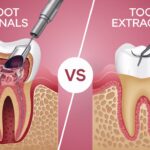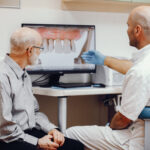The Importance of a Routine Dental Check-up
Most dentists and dental experts recommend a regular dental checkup every six months. You should ideally go for regular dental cleanings and dental checkups once every six months to maintain optimal oral health and minimize the risk of dental problems. Despite the commonality of that recommendation, most patients are skeptical about the claim — some assume that it’s a means to keep patients returning to the dentist without any real problem. However, the value of a regular dental checkup cannot be understated. Below, we describe why a regular dental checkup is important.Prevent the accumulation of plaque and tartar
Regardless of how well you brush and floss your teeth, you can’t remove all the smallest bits of food particles stuck between your teeth and gum line. Over time, these food particles can turn into a whitish substance known as plaque, which eventually interacts with your saliva and bacteria to become tartar, a yellowish substance that can’t be removed with regular brushing. Plaque and tartar increase the risk of bacterial decay, cavities, gum disease, and various other problems. If you maintain optimal oral health, you may not generate a high volume of plaque and tartar within six months. However, you still have to go for regular dental checkups and cleanings to remove all the plaque and tartar, thus restoring optimal oral health. Some patients with misaligned teeth or a high risk of gum disease may also need more frequent dental cleanings. Without regular dental cleanings, the accumulation of plaque and tartar may eventually lead to gingivitis or periodontitis.All dental problems and conditions are chronic
All dental problems and conditions are inherently chronic, i.e., they gradually worsen with time. The longer you delay dental treatments, the worse your dental conditions will get, necessitating even more complex procedures later. For example, if you treat small cavities at the earliest stage, you may only need a dental filling. But if you leave cavities untreated, you may eventually need root canals or even tooth extractions. Regular dental checkup allows you to identify and treat dental problems at the earliest stage possible.Dental problems don’t have noticeable symptoms initially
Most dental problems don’t cause noticeable symptoms at the earliest stages, giving you the impression that you don’t need dental treatments. Cavities don’t cause any pain or discomfort at the early stages because the enamel layer of your teeth doesn’t have any nerve endings. However, if you don’t treat cavities at this stage, they continue spreading into the pulp chamber, leading to excruciating pain. At that stage, you need a root canal instead of fillings. As such, you may think you have perfect oral health and thus no need to undergo dental checkups and treatments, but that’s not correct. You should go for regular dental checkups to maintain perfect oral health and prevent needing advanced treatments. By the time you experience pain and discomfort, your dental problems may have reached an advanced stage necessitating complex procedures, such as tooth extractions. As such, you must trust your dentist when they say you need dental treatments.Your dental health also affects your overall health
Some people avoid dental checkups because they believe teeth aren’t as important or that your oral health doesn’t affect your overall health. This view is precipitated by the fact that oral health is viewed separately from general healthcare. But your mouth is a part of your overall anatomy, so dental health can also affect your overall health. Periodontitis, for example, increases the risk of diabetes, strokes, arthritis, and numerous other health concerns. You must undergo regular dental checkups to maintain optimal oral health and overall health.What happens during the dental visit?
During the dental checkup, the dentist will examine your teeth to determine if you have cavities or the signs of gum disease. The dentist may take x-rays to detect cavities that can’t be seen from the outside. Furthermore, the dentist will also examine the level of plaque and tartar on your teeth and gums to determine if you need any dental treatments. After examining your teeth, the dentist will use a special tool to examine the pockets of space between your gums and teeth. Healthy gums should have extremely narrow periodontal pockets — if the pockets are wide, you may have periodontitis. The dentist should also examine your face, neck, and head for signs and symptoms of oral cancer. After the dental examination, the dentist will proceed with a dental cleaning. This involves using specialized scaling tools to scrape away all the accumulated plaque and tartar from your teeth and gums. After removing the plaque and tartar, the dentist in Houston, TX, will brush and floss your teeth and apply a fluoride solution to minimize the risk of bacterial decay.How to maintain optimal oral health?
- Brush at least twice a day using a fluoride-based toothpaste
- Carefully floss your teeth to remove all the food particles
- Rinse your mouth with an antibacterial mouthwash
- Go for dental checkups and cleanings once every six months
- Never delay your dental treatments
- Wear mouthguards while playing sports
Schedule your dentist appointment near me today
URBN Dental is one of the most reliable and reputable dental clinics for regular dental cleanings and dental checkups in Houston, TX. We have two state-of-the-art dental clinics in Midtown Houston and Uptown Houston. Our Midtown Houston dental clinic is located at 3510 Main St. Ste E, Houston, and our Uptown Houston dental clinic is located at 2400 Mid Ln. #350, Houston, TX. If you’re looking for a dentist open on Saturday or an emergency dentist, we encourage you to consult our dentists. Please schedule your dentist appointment near me today — you can also call 832-743-2989 or 346-955-7006.URBN Dental Services in Houston, TX
Houston | Katy | Montrose | West University Place | Greater Third Ward | Greater East End | North East Houston | Houston Heights | Central Northwest | Fairbanks | Acres Home | East Houston | Southeast Houston | Central Southwest | Fort Bend Houston | Brays Oaks | Meyerland Area | Sharpstown | Alief | Westchase | Memorial | Northwest Houston | Katyland | Whispering Lakes | Pine Lakes | Woodcreek Reserve















